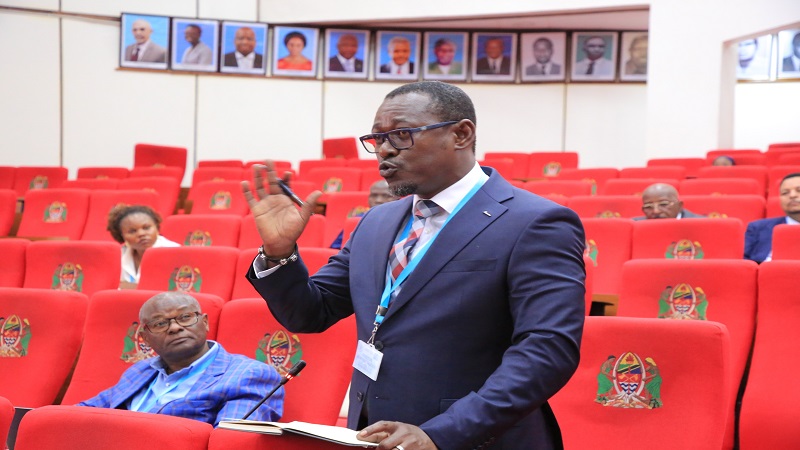Minister lauds law amendments targeting workers’ well-being

In ensuring there is a conducive environment for attracting investment and creating decent jobs, the government in collaboration with the private sector has endorsed amendments to the labour laws initiated last year.
Ridhiwani Kikwete, Minister of State, Prime Minister's Office - Labour, Youth, Employment and Persons with Disabilities, said on Thursday in Dar es Salaam at the Association of Tanzania Employers (ATE) Annual General Meeting (AGM) that the amendments in the laws are aimed at bringing productivity and efficiency to continue to stimulate the economy and strengthen inclusive growth.
He said employers last year were made aware of the amendments to Tanzania’s Labour Laws including the Employment and Labour Relations Act (Cap. 366), the Labour Institutions Act (Cap.300) and the non-citizens (Employment Regulation) Cap. 436 aimed at fostering a fairer and more inclusive environment.
"The amendments of the laws among other things, have extended maternity leave for a woman who gives birth to a newborn baby, the maternity leave period will include forty weeks of pregnancy," said Kikwete.
He said that considering the importance of mothers and fathers in the life of a child, this leave has also been increased for fathers, who have also received an increase from three days to seven days for the father of a newborn baby.
cvExplaining about the amendments to the law, he said that the limitation of compensation for illegal dismissal is among the amendments to the law where section 40(1) (c) of the Employment and Labour Relations Act has set a limit of compensation of not more than twenty-four months.
The government is continuing with improvements to the Labour Laws so as to, among other things, continue to strengthen the coordination and management of trade unions and employers which are important for economic growth and social welfare in the country.
According to him, in ensuring that there is a strong economy that is growing rapidly while the welfare of societies prevails, the government continues to create an environment to ensure that the workplace is stable to increase production and service delivery.
The government recognizes that employers are an important pillar in building the country's economy.
Through the Tanzania Employers Association, he said, employers have the opportunity to come together to advise the government on the best way to create a platform to facilitate a mutually beneficial environment between all parties, namely employers, government and employees.
Suzanne Ndomba-Doran, ATE Chief Executive Officer said that to encourage more employers towards advocating for amendments ATE organised an Employers Symposium earlier with the main objective of providing a platform for Employers to express their opinions on the amendments.
Themed ‘Labour Productivity: Discussion on Amendments of Labour Laws 2025’ Employers sought a middle ground on how to improve productivity with the latest amendments to the Labour Laws.
She said labour laws can have a complex and multi-faceted impact on productivity. Well-crafted labour laws can lead to a more productive and inclusive economy by fostering fairness, motivation and efficiency.
She asserted that stronger labour laws are associated with increased employment and reduced employee turnover as workers feel more secure. Finding the right balance between protecting workers and promoting business flexibility is crucial for maximising both worker well-being and economic productivity.
This year the Parliament of the United Republic of Tanzania approved the Labour Laws (Amendments) Bill, 2024, which includes an extension of maternity leave for women giving birth to premature babies from 36 weeks to 40 weeks. It also provides seven days of leave for fathers of premature babies.
“ATE is humbled to be part of the advocacy process that led to the amendments. Other amendments include the change in the vague definition of a specified period contract previously limited to professionals and managerial staff,” she said.
The amendment has been expanded to include, graduates seeking work experience, employees on time-bound projects, seasonal workers, non-citizens with limited work permits, retirees rehired post-retirement, and employees in externally funded roles allowing for the legal clarity and protection for workers in non-permanent roles.
She said employees can now apply for up to 30 days of unpaid leave, with possible extensions under regulatory conditions. Previously, unpaid leave had no specified duration, leading to inconsistencies.
Furthermore Employers cannot initiate or continue disciplinary proceedings against an employee if a dispute is already before the Commission for Mediation and Arbitration (CMA) or the Labour Court.
Employers and employees can now negotiate special terms during outbreaks of infectious diseases or other emergencies.
This ensures business continuity while safeguarding employee for the compensation for breach of fixed-term contracts, the amendments have provided Arbitrators and the Labour Court with the power to order the compensation to be paid by an employer who has committed a material breach of a fixed term contract to the employee which is equal to the remuneration for the remaining term of the contract.
This strengthens job security for contract workers; stricter penalty enforcement has been laid for offenders who settle labour violations via compounding and must now pay 100,000/- directly into the Government Consolidated Fund (unless exempted by the Finance Minister).
This ensures transparency in penalty enforcement. Work permit flexibility for Class A holders is now available for investors and shareholders.
With the amendments Class A holders no longer need separate permits for each company they engage with. Instead, they must obtain written authorisation from the Labour Commissioner with a TRA tax clearance certificate. This reduces bureaucracy for investors while ensuring compliance.
None citizens can now obtain work permits valid for the duration of their refugee status. Permit renewals must be filed 60 days before expiry date. This amendment promotes inclusivity and formal employment opportunities for refugees.
Top Headlines
© 2025 IPPMEDIA.COM. ALL RIGHTS RESERVED

























